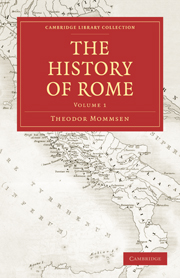Book contents
- Frontmatter
- PREFACE
- PREFATORY NOTE BY THE TRANSLATOR
- EXTRACT FROM DR. MOMMSEN'S PREFACE
- Contents
- BOOK FIRST THE PERIOD ANTERIOR TO THE ABOLITION OF THE MONARCHY
- BOOK SECOND FROM THE ABOLITION OF THE MONARCHY IN ROME TO THE UNION OF ITALY
- CHAPTER I CHANGE OF THE CONSTITUTION.—LIMITATION OF THE POWER OF THE MAGISTRATE
- CHAPTER II THE TRIBUNATE OF THE PLEBS AND THE DECEMVIRATE
- CHAPTER III THE EQUALIZATION OF THE ORDERS AND THE NEW ARISTOCRACY
- CHAPTER IV FALL OF THE ETRUSCAN POWER. THE CELTS
- CHAPTER V SUBJUGATION OF THE LATINS AND CAMPANIANS BY ROME
- CHAPTER VI STRUGGLE OF THE ITALIANS AGAINST ROME
- CHAPTER VII THE STRUGGLE BETWEEN PYRRHUS AND ROME
- CHAPTER VIII LAW. RELIGION. MILITARY SYSTEM. ECONOMIC CONDITION. NATIONALITY
- CHAPTER IX ART AND SCIENCE
- APPENDIX: ON THE PATRICIAN CLAUDII
- ADDITIONS AND CORRECTIONS
CHAPTER VI - STRUGGLE OF THE ITALIANS AGAINST ROME
Published online by Cambridge University Press: 05 October 2010
- Frontmatter
- PREFACE
- PREFATORY NOTE BY THE TRANSLATOR
- EXTRACT FROM DR. MOMMSEN'S PREFACE
- Contents
- BOOK FIRST THE PERIOD ANTERIOR TO THE ABOLITION OF THE MONARCHY
- BOOK SECOND FROM THE ABOLITION OF THE MONARCHY IN ROME TO THE UNION OF ITALY
- CHAPTER I CHANGE OF THE CONSTITUTION.—LIMITATION OF THE POWER OF THE MAGISTRATE
- CHAPTER II THE TRIBUNATE OF THE PLEBS AND THE DECEMVIRATE
- CHAPTER III THE EQUALIZATION OF THE ORDERS AND THE NEW ARISTOCRACY
- CHAPTER IV FALL OF THE ETRUSCAN POWER. THE CELTS
- CHAPTER V SUBJUGATION OF THE LATINS AND CAMPANIANS BY ROME
- CHAPTER VI STRUGGLE OF THE ITALIANS AGAINST ROME
- CHAPTER VII THE STRUGGLE BETWEEN PYRRHUS AND ROME
- CHAPTER VIII LAW. RELIGION. MILITARY SYSTEM. ECONOMIC CONDITION. NATIONALITY
- CHAPTER IX ART AND SCIENCE
- APPENDIX: ON THE PATRICIAN CLAUDII
- ADDITIONS AND CORRECTIONS
Summary
Wars between the Sabellians and Tarentines.
Archidamus.
Alexander the Molosian.
While the Romans were fighting on the Liris and Volturnus, other conflicts agitated the south-east of the peninsula. The wealthy merchant-republic of Tarentum, daily exposed to more serious peril from the Lucanian and Messapian bands, and justly distrusting its own sword, gained by good words and better coin the help of condottieri from the mothercountry. The Spartan king, Archidamus, who with a strong band had come to the assistance of his fellow-Dorians, succumbed to the Lucanians on the same day on which Philip conquered at Chseronea (416); a retribution, in the belief of the pious Greeks, for the share which, nineteen years previously, he and his people had taken in pillaging the sanctuary of Delphi. His place was taken by an abler commander, Alexander the Molossian, brother of Olympias the mother of Alexander the Great. In addition to the troops which he had brought along with him, he united under his banner the contingents of the Greek cities, especially those of the Tarentines and Metapontines; the Poediculi (around Eubi, now Euvo), who, like the Greeks, found themselves in danger from the Sabellian nation; and lastly, even Lucanian exiles themselves, whose considerable numbers point to the existence of violent internal disorganization in that confederacy. Thus he soon found himself superior to the enemy. Consentia (Cosenza), which seems to have been the federal headquarters of the Sabellians settled in Magna Grsecia, fell into his hands. In vain the Samnites came to the help of the Lucanians; Alexander defeated their combined forces near Pæstum.
- Type
- Chapter
- Information
- The History of Rome , pp. 371 - 393Publisher: Cambridge University PressPrint publication year: 2010First published in: 1862

